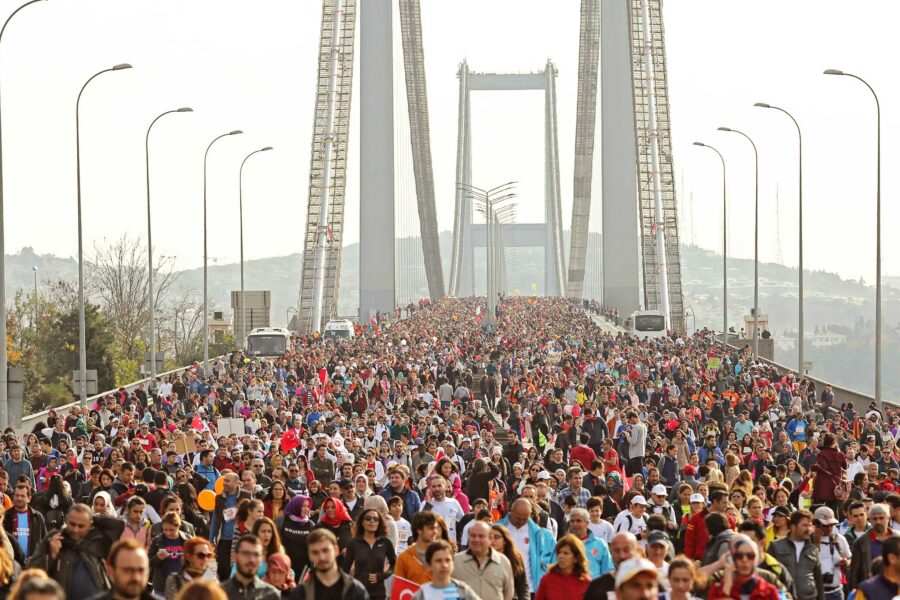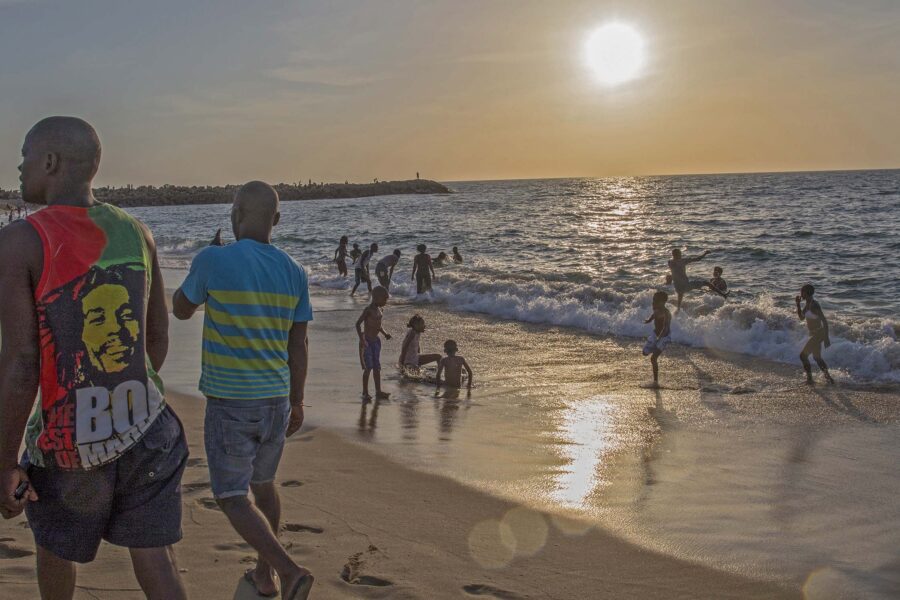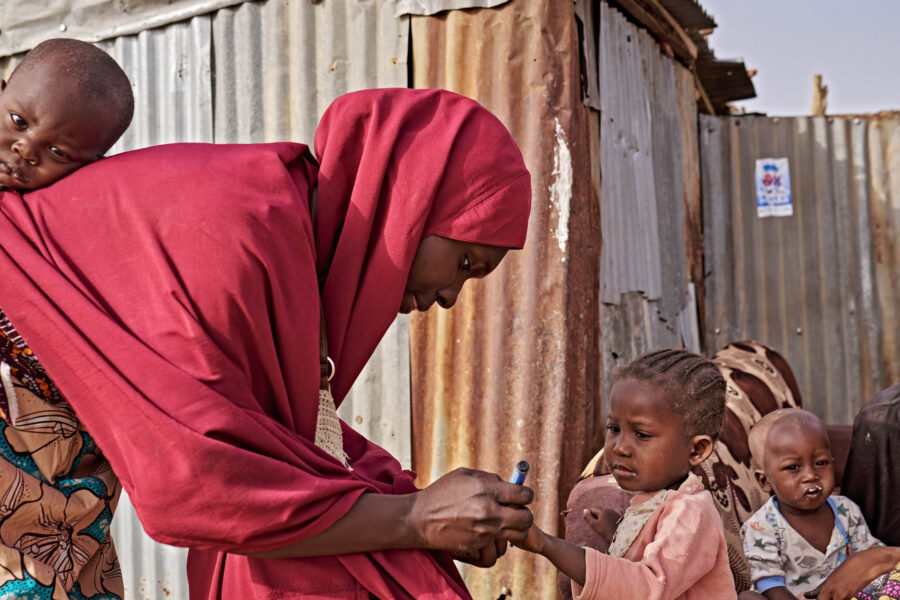Supporting women caught in the Palestine conflict
While the war on Gaza devastates all its inhabitants as neighborhoods turn to rubble, the toll on Gazan women is particularly shocking. The world must act now to stop the immediate suffering – and then commit to the harder work of helping women rebuild their lives in a peaceful future
Gender

In the heart of one of the world’s most protracted conflicts lies a group whose voices often go unheard amid the clamor of geopolitical tensions and military posturing: Palestinian women. Caught in the crossfire of a decades-long struggle for self-determination, these women endure unimaginable hardships, yet their resilience and determination remain an inspiration to us all. As the international community grapples with finding a lasting solution to the Palestine-Israel conflict, it is imperative that we prioritize the needs and rights of Palestinian women, who bear the brunt of the conflict’s impact on their daily lives.
From Gaza to the West Bank, Palestinian women face myriad challenges that threaten their safety, well-being, and dignity. The ongoing blockade of Gaza, now in its 15th year, has led to severe shortages of essential goods and services, leaving women and their families struggling to access adequate healthcare, education, and employment opportunities. The relentless cycle of violence and insecurity in the region further exacerbates their plight, with women and children often bearing the heaviest burden of conflict-related trauma and displacement.
Amid the rubble and ruins of Gaza, women endure the main impact of a conflict that spares no one. As the war on Gaza enters its fifth month, the toll on women is staggering. According to UN Women data, an estimated 9,000 women have been killed by Israeli forces in Gaza since the onset of the conflict. Shockingly, this figure is likely an underestimate, as many more women are believed to have perished under the rubble of bombed-out buildings. Each day the conflict persists, an average of 63 women continue to lose their lives, leaving behind shattered families and communities. The toll on mothers is especially heart-wrenching, with an estimated 37 mothers losing their lives every day, robbing their children of crucial protection and support.
The impact of the conflict on women extends far beyond the loss of life. As the violence persists, access to essential resources such as food has become increasingly scarce. Reports indicate that more than 80% of women in Gaza report a significant reduction in family meals since the conflict began. The looming threat of famine further exacerbates this crisis, with limited access to food and humanitarian aid due to restricted border crossings. Before the escalation of hostilities, around 500 commercial and aid trucks entered Gaza daily. Now, only two border crossings are available, severely limiting the flow of essential supplies. The World Food Programme has warned that it can only meet 20% of its monthly targets, leaving thousands of families at risk of starvation.
Beyond the visible horrors of death and hunger, women in Gaza grapple with less apparent struggles that exacerbate their daily suffering. Access to menstrual hygiene products is severely limited, forcing many women to resort to makeshift alternatives like tent fabric. This lack of access not only compromises their dignity but also poses significant health risks. Inadequate sanitation facilities further compound women’s discomfort, with pregnant women particularly vulnerable to unsanitary conditions. The dire situation underscores the urgent need for humanitarian intervention to address women’s unique vulnerabilities and uphold their basic rights and dignity.
Symptom of a wider problem
The plight of women in Gaza is a microcosm of broader systemic challenges that hinder progress toward the Sustainable Development Goals (SDGs). Access to adequate healthcare services, including reproductive and maternal healthcare, is critical to addressing women’s health challenges and aligning with SDG 3 (good health and well-being). Likewise, improving access to clean water and sanitation facilities is essential for promoting women’s health and dignity, aligning with SDG 6 (clean water and sanitation). Tragically, some women have lost their families or husbands in the conflict, leaving them without vital support networks. Their voices must be heard in decision-making processes and peacebuilding efforts to achieve lasting peace and sustainable development, aligning with SDG 16 (peace, justice, and strong institutions).
Toward peace, equity, and prosperity
As we strive toward the SDGs by 2030, prioritizing the needs and rights of Palestinian women is paramount. By empowering women, addressing systemic inequalities, and promoting inclusive opportunities, we can create a more sustainable and prosperous future for all Palestinians. Immediate humanitarian action is needed to prevent further loss of life and alleviate suffering in Gaza. The cessation of violence and the swift delivery of humanitarian aid are imperative to save lives and pave the way for a brighter future. We must stand in solidarity with Palestinian women and work toward a future where peace, justice, and gender equality prevail.
One crucial aspect of supporting Palestinian women in conflict-affected areas is addressing the root causes of the Palestine-Israel conflict for achieving lasting peace and security in the region. This requires genuine political will and commitment from all parties involved to engage in meaningful dialogue and negotiations aimed at finding a just and equitable solution to the conflict. Women must be included as equal partners in these peace processes, as their perspectives and experiences are essential for building sustainable peace.
In conclusion, immediate measures are imperative to tackle the humanitarian crisis in Gaza. This entails removing barriers and constraints on aid distribution and reinstating commercial traffic to effectively address the escalating hunger crisis. A humanitarian ceasefire is essential to facilitate a comprehensive, collaborative intervention aimed at averting further anguish and loss of life. Crucially, efforts must focus on bolstering and sustaining humanitarian access to vital resources such as fuel, water, food, and medications, alongside expanding safe passages for aid delivery within Gaza. Ensuring unhindered medical evacuations and actively safeguarding civilians and healthcare infrastructure are also paramount to uphold the functionality of remaining medical facilities. Lastly, establishing and reinforcing a standardized protocol for evacuating patients requiring medical attention, irrespective of their gender, age, disability, or other characteristic, is of utmost importance.
These initiatives resonate with the SDGs and are pivotal in mitigating the plight of Gazans while fostering a trajectory toward peace, equity, and prosperity.





